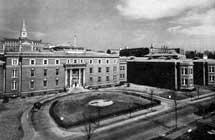About
Overview & History
While the College offers excellent research and research training opportunities, the major emphasis is on preparing students to deliver patient care in communities that have a shortage of physicians and public health professionals.
The College living alumni, more than 4,000, are a testimony that an excellent medical education can be obtained at Howard. Although opportunities for minority students have increased at other medical schools, the College uniquely addresses the special health care needs of medically underserved communities and continues to produce a significant number of the nation's minority physicians. The College is a part of Howard University, a comprehensive research university. While the University community has traditionally been predominantly black, Howard has been an interracial and cosmopolitan institution throughout its history, with students, faculty and staff of all races and from many foreign nations. All must meet the high standards of excellence of Howard University, which has the largest concentration of black faculty and student scholars in the country.
In addition to the College of Medicine, the Howard University Health Sciences Center includes the Howard University Hospital; the College of Dentistry; the College of Pharmacy, Nursing and Allied Health Sciences; the Louis Stokes Health Sciences Library; and the Student Health Center. Located in the nation's capital, the College can draw upon the immense medical resources of this area, including the National Institutes of Health and the National Library of Medicine.
Degree Programs
The academic program leading to the M.D. degree from the Howard University College of Medicine is designed to produce physicians who are knowledgeable of the principles of modern medical science and who have mastered the art of critical thinking in the clinical decision-making process in order to engage in the practice of medicine as competent professionals.
Dual degree programs are offered jointly with the Graduate School (M.D./Ph.D.) and the College of Arts & Sciences (B.S./M.D.).
Six training programs leading to the Master of Science and/or Doctor of Philosophy degree are available in the College of Medicine. These degrees are offered through programs in anatomy, genetics & human genetics, microbiology, biochemistry, pharmacology and physiology & biophysics. For admission and specific degree requirements, students should consult the Graduate School.
Accreditation
Howard University is accredited by the Middle States Association of Secondary Schools and Colleges. The College of Medicine is accredited by the Liasison Committee on Medical Education and the Association of American Medical Colleges (AAMC) and the American Medical Association (AMA). The Howard University College of Medicine has received notice of FULL ACCREDITATION from the Liaison Committee on Medical Education (LCME). The accreditation of the medical education program will extend through an eight-year term with a visit scheduled for the Academic Year 2024-2025.
The Howard University College of Medicine first opened its doors as a medical department in 1868, just three years after the close of the Civil War. At that time, newly freed black people were migrating to the nation's capital in large numbers. The founders of the College recognized that the nearly overwhelming health care needs of this population and of other blacks throughout this country would be met best by training students to become highly competent, compassionate physicians who would deliver care in communities having a shortage of health personnel.
That realization was translated into the mission of the Howard University College of Medicine, and the continuing fulfillment of that mission is evidenced by the illustrious record of service provided by the College's alumni and faculty.
Mission, Vision and Core Values
The College of Medicine dates from 1868 and serves a broad constituency, with about 70% of the student body being U.S. underrepresented minorities and a substantial number being from foreign countries. There are over 4,000 living alumni, making up a large percentage of the black physicians practicing in this country.
Mission
Howard University College of Medicine provides students of high academic potential with a medical education of exceptional quality and prepares physicians and other health care professionals to serve the underserved. Particular focus is on the education of disadvantaged students for careers in medicine. Emphasis is placed on developing skills and habits of life-long learning and producing world leaders in medicine. Special attention is directed to teaching and research activities that address health care disparities.
The College also seeks to improve the health of Americans and the global community through public health training programs and initiatives. Our mission also includes the discovery of new knowledge through research. Lastly, the College supports the education and training of postgraduate physicians, other health care providers, and graduate students in the biomedical sciences.
Vision
The goal of the Howard University College of Medicine is to enhance our global recognition as a medical school of the first rank, known for the excellence of our teaching, research and service. We will continue to be a world leader in the training of competent, compassionate physicians and other health professionals for medically underserved communities and populations. In addition, the College envisions that it will be an exemplar in eliminating health disparities and in finding solutions through research and public health programs for medical problems disproportionately found in disadvantaged communities, both in this nation and abroad.
Core Values
The core values of the Howard University College of Medicine are:
- fidelity to our mission and a strong and confident belief in our work;
- excellence and integrity in all that we undertake--teaching, research, and service;
- leadership in medical education and health care, especially for African Americans, other minorities, and the economically disadvantaged;
- service to our community, the nation, and the world through public health programs, medical care, and health education;
- the unrelenting pursuit of knowledge through research and life-long learning; and
- a commitment to cultural diversity among faculty, staff and students and to ensuring a respectful and ethical academic environment.
Goals & Objectives
The academic program leading to the M.D. degree from the Howard University College of Medicine is designed to produce physicians who are knowledgeable of the principles of modern medical science and who have mastered the art of critical thinking in the clinical decision-making process in order to engage in the practice of medicine as competent professionals.
Graduates of the medical program are expected to exhibit compassion and professional attitudes and conduct. They are expected to be self-directed, committed and resourceful life-long learners who adhere to ethical standards of behavior and serve diverse populations.
These goals shall be accomplished by the following educational objectives. Prior to graduation, each student enrolled in the medical program is expected to:
- Acquire current core knowledge of basic biomedical science through an interdisciplinary approach to the understanding of the processes that support normal development, structure and function of the human organism.
- Acquire current core knowledge of normal and altered structure and function of organ systems, in order to apply that knowledge to the recognition and management of complex clinical conditions.
- Demonstrate the ability to evaluate patients and properly manage their medical problems by completing a comprehensive history and physical examination. These steps should be followed by the application of (1) critical thinking to correctly identify patients' medical problems and to formulate hypotheses as to etiologies and solutions; (2) successful development of diagnostic strategies; and (3) formulation and implementation of a management plan.
- Acquire knowledge of the scientific method in medical diagnosis, treatment and research. The student should be able to evaluate published findings and to apply scientific evidence-based reasoning to the solution of medical problems.
- Acquire current core knowledge to understand the impact of the various stages of life, as well as the effects of gender, life style, socioeconomic status, nutritional factors, genetic characteristics, psychosocial and epidemiologic factors, and culture upon the quality of human health and the prevalence of disease, disease prevention and health maintenance.
- Demonstrate an understanding of the fundamental concepts of continuity of care (preventive, rehabilitative and end-of-life) in addition to the diagnosis of acute medical problems, and be able to apply these concepts to clinical practice on a local, regional, national or international level.
- Demonstrate mastery of a variety of skills, such as effective communication when interviewing patients and explaining the necessity for patient compliance. The student must also demonstrate appropriate physical examination skills, such as proper use of instruments and application of manual techniques and skills in utilization of laboratory resources, such as ordering appropriate tests and interpreting values.
- Exhibit appropriate professional behavior in patient and peer interactions; to adhere to professional standards of ethical behavior; and to function harmoniously and respectfully as a member of a diverse health care team.
- Satisfy requirements essential to enter (USMLE Step 1) and progress (USMLE Step 2) along the pathway toward licensure for the practice of medicine.
- Display skills of independent, life-long, and progressive learning.
- Manifest self-awareness, self-care, self-assessment, and personal growth sufficient to be a role model for others.
- Develop sensitivity toward the need to address and resolve health disparities at all levels.
- Satisfy the scholarly expectations of the medical faculty as determined by appropriately designed and applied assessment methodologies, including but not limited to written examination performance.


